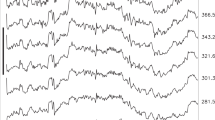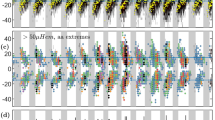Abstract
THE clearness of the sky, and the absence of the moon's light at the end of July and in the beginning of August last, were unusually favourable conditions here for watching the progress of the August meteor-shower of Perseïds from the first signs of its appearance up to very near its date of greatest brightness. Having intended to observe the shower in connection with a watch arranged by Mr. Denning to be kept on the Perseïds this year at many places, and an early beginning of the watch having been recommended, in order to note the progressive changes of the radiant-point's position, I had little expectation of being able to contribute much to this inquiry from the usual scarcity of the Perseïd meteors in the shower's early stages.
This is a preview of subscription content, access via your institution
Access options
Subscribe to this journal
Receive 51 print issues and online access
$199.00 per year
only $3.90 per issue
Buy this article
- Purchase on Springer Link
- Instant access to full article PDF
Prices may be subject to local taxes which are calculated during checkout
Similar content being viewed by others
Author information
Authors and Affiliations
Rights and permissions
About this article
Cite this article
HERSCHEL, A. Outlying Clusters of the Perseïds. Nature 56, 540–544 (1897). https://doi.org/10.1038/056540c0
Issue Date:
DOI: https://doi.org/10.1038/056540c0
Comments
By submitting a comment you agree to abide by our Terms and Community Guidelines. If you find something abusive or that does not comply with our terms or guidelines please flag it as inappropriate.



